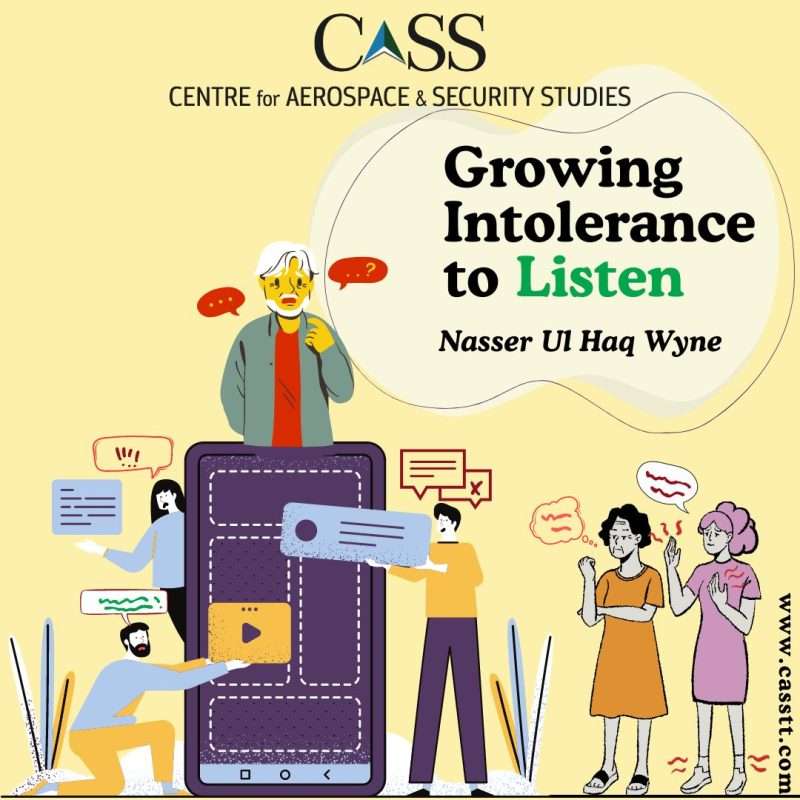Have you noticed a significant decline in our willingness to listen during everyday conversations? There was a time when our elders stressed the importance of letting someone finish their thoughts before responding. Nowadays, however, many of us tend to interrupt and only partially listen to others, rushing to assert our own opinions without fully understanding the subject. Ironically, this tendency is particularly prevalent among older individuals (not just youngsters) and those in positions of authority, who may see themselves as ‘all-knowing’, more experienced, or even infallible.
As Muslims, we claim to draw our inspiration from the Sunnah of our Holy Prophet (PBUH) but fail to emulate him in this particular aspect. The Prophet would attentively turn his entire body towards the speaker, demonstrating respect and giving importance to every individual he communicated with, regardless of their age, gender, or level of knowledge. ‘Consultation’ was an important Uswa-e-Husna, practiced by the Prophet. Despite the fact that he used to get direct guidance from the Almighty; he would consult his companions not only to groom them but also to leave a legacy and a norm for his followers. Are we following his legacy of consultation? Do we have enough tolerance to listen is the question that we must ask ourselves and find ways to overcome this shortcoming.
This dilemma of ‘not listening’ extends beyond the workplace and into our homes as well. Often, elder family members, such as fathers, initiate discussions with good intentions but find themselves speaking more to themselves than to others. The younger generation, despite being well-versed in modern technologies like AI and IoT, frequently lacks the opportunity to contribute meaningfully to these conversations, leading to unproductive exchanges. This intolerance is also evident on social media platforms, where many individuals are unwilling to consider perspectives different from their own.
Consider the talk shows on TV channels as an example, where invited experts often seem unwilling to listen to others’ viewpoints. More and more, one sees that news anchors impose their own perspectives, continually interrupting their guests. Similarly, in courtrooms, judges often interject quickly, not allowing lawyers to fully present their arguments. In essence, the norm in our culture has increasingly become one of interruption and a lack of patience.
What are the repercussions of this ‘not listening’ phenomenon that has infiltrated our society?
The habit of casually hearing others, or outright unwillingness to listen, can lead to receiving inaccurate or incomplete information, ultimately resulting in poor decision-making. For instance, when subordinates, who have conducted thorough qualitative and quantitative research on a subject, are ignored, it not only demotivates them but can also decrease the overall efficiency of an organisation. This lack of attention can foster conflict, division, and polarisation within a team or organisation.
Furthermore, when individuals hold back their contributions for fear of being dismissed, it stunts their developmental process, adversely affecting the quality of future leadership. In professional settings such as seminars, discussions, and conferences, audience members often make comments rather than asking questions. This behaviour can give the impression of knowing more than the expert speakers, reflecting a culture of intolerance and a difficulty in accepting others’ viewpoints.
To counteract this, a practical approach can be to consciously remind oneself during conversations to listen attentively. Mentally repeating phrases like ‘listen to him/her, let him/her complete’ can be an effective strategy to enhance our listening skills. This simple technique can foster a more respectful and productive exchange of ideas. By practicing this, we open ourselves to a wider range of perspectives, leading to more inclusive and well-informed decisions.
Another approach, advocated in psychology to enhance listening is through ‘empathetic listening.’ This involves actively trying to understand the speaker’s emotions and viewpoints, not just the words they are saying. When you listen empathetically, you are not just waiting for your turn to speak; instead, you are genuinely trying to grasp the speaker’s emotions and motivations. This technique requires patience, openness, and a non-judgmental attitude. By exercising empathetic listening, we not only hear what is being said but also connect with the speaker on an emotional level. This deepens mutual understanding and respect, fosters a stronger connection, and often leads to more effective and harmonious communication. Empathetic listening can transform conversations, making them more meaningful and productive, both in personal and professional settings.
As a society and nation, let us embrace the art of listening with open hearts and minds – it is a small step that can lead to giant leaps in understanding, collaboration and meaningful conversations.
Nasser Ul Haq Wyne is a retired Air Vice Marshal currently serving as Director at the Centre for Aerospace & Security Studies, Islamabad, Pakistan. He can be contacted at: [email protected].





